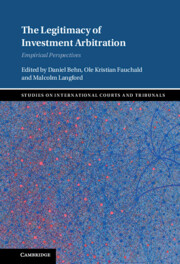Book contents
- The Legitimacy of Investment Arbitration
- Studies on International Courts and Tribunals
- The Legitimacy of Investment Arbitration
- Copyright page
- Contents
- Figures
- Tables
- Contributors
- 1 Introduction: The Legitimacy Crisis and the Empirical Turn
- 2 The International Investment Regime and Its Discontents
- Part I Process Legitimacy
- Part II Process Legitimacy
- Part III Output Legitimacy
- Part IV Legitimation Strategies
- 15 Does International Arbitration Enfeeble or Enhance Local Legal Institutions?
- 16 Learning from Investment Treaty Law and Arbitration: Developing States and Power Inequalities
- 17 Legitimation through Modification: Do States Seek More Regulatory Space in Their Investment Agreements?
- Index
17 - Legitimation through Modification: Do States Seek More Regulatory Space in Their Investment Agreements?
from Part IV - Legitimation Strategies
Published online by Cambridge University Press: 06 January 2022
- The Legitimacy of Investment Arbitration
- Studies on International Courts and Tribunals
- The Legitimacy of Investment Arbitration
- Copyright page
- Contents
- Figures
- Tables
- Contributors
- 1 Introduction: The Legitimacy Crisis and the Empirical Turn
- 2 The International Investment Regime and Its Discontents
- Part I Process Legitimacy
- Part II Process Legitimacy
- Part III Output Legitimacy
- Part IV Legitimation Strategies
- 15 Does International Arbitration Enfeeble or Enhance Local Legal Institutions?
- 16 Learning from Investment Treaty Law and Arbitration: Developing States and Power Inequalities
- 17 Legitimation through Modification: Do States Seek More Regulatory Space in Their Investment Agreements?
- Index
Summary
The starting point is the observation that some states are and have been unhappy with certain BITs that include ISDS provisions. Based on a dataset on renegotiated and terminated BITs, the authors ask if this is the case. The initial evidence indicates that states have not made a systematic effort over the years to recalibrate their BITs for the purpose of preserving more regulatory space. In fact, most renegotiations either leave ISDS provisions unchanged or render them more investor-friendly. Nevertheless, the authors find that this is beginning to change, as recent renegotiations are more likely to circumscribe ISDS in ways that preserve more state regulatory space.
Keywords
- Type
- Chapter
- Information
- The Legitimacy of Investment ArbitrationEmpirical Perspectives, pp. 531 - 554Publisher: Cambridge University PressPrint publication year: 2022
- 1
- Cited by

